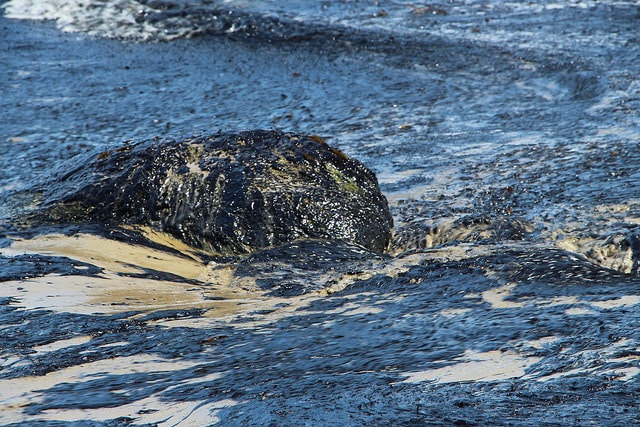Plains All American Pipeline, the company responsible for the 9-mile long oil slick polluting the California coast near Santa Barbara, is no stranger to oil spills.
The LA Times examined data kept by the Pipeline and Hazardous Materials Safety Administration and discovered that Plains has been cited for 175 safety and maintenance violations since 2006, and incidents involving the company’s pipes have caused more than $23 million in property damage while spilling more than 688,000 gallons of “hazardous liquid.”
That’s more than 3 times the national average for incidents per mile of pipe, the Times reports, adding that among the more than 1,700 pipeline operators listed in the PHMSA database, only four companies had more infractions than Plains.
Plains All American has been cited for everything from not completing repairs ordered by inspectors and failing to install equipment to prevent pipe corrosion to not having adequate firefighting gear at its facilities and instead relying on local volunteer fire departments.
Plains is hardly alone in its track record of reckless operations. According to another analysis of PHMSA data by the Center for Biological Diversity, there have been 621 oil and gas pipeline leaks, spills, ruptures, explosions and other incidents in the state of California since 1986. All told, these accidents have caused some 200 injuries, nearly 50 deaths and $769 million in damages, the CBD says.
If you live in California and are wondering whether or not one of these incidents happened near you, you can watch this time-lapse video CBD created to show where each of the 621 incidents occurred (hint: if you live in California, one of these incidents happened near you):
“The Santa Barbara spill is just the latest example of fossil fuel pipelines’ toxic threat to people and wildlife in California,” Miyoko Sakashita, the Center for Biological Diversity’s oceans program director, said in a statement sent to DeSmog. “These dangerous pipelines highlight the broader risks of oil production in our ocean and on land.”
The CBD analysis of PHMSA data also revealed that there have been 8,000 significant incidents with US pipelines since 1986 – more than 300 incidents per year involving death, injury, or economic and environmental damage.
Though Plains’ pipeline ruptured onshore where it ran along a coastal highway, the oil that spilled was being sent from an Exxon offshore oil drilling platform. As much as 105,000 gallons of oil (2,500 barrels) are thought to have spilled, with about a fifth of that making its way to the Pacific Ocean.
The spill happened near a national marine sanctuary and a state underwater preserve that teems with dolphins, whales and other marine life. It is expected to take several months to clean up.
As reported by Steve Horn here on DeSmog, environmentalists filed a lawsuit against the US Bureau of Ocean Energy Management just a few months ago after it was revealed the agency had secretly permitted offshore fracking in deepwater areas off California’s coast. Exxon issued a motion to intervene and is now a co-defendant in the case.
It is not known whether any of the oil might have contained fracking chemicals or fluids from other extreme oil production techniques like acidization, according to the Center for Biological Diversity spokesman Patrick Sullivan.
“Poor federal record keeping makes it impossible to know how much fracking has happened in the Santa Barbara Channel,” Sullivan told DeSmog. “We do know that the federal government has recently given 51 permits authorizing acidizing and fracking from six offshore platforms, including three that feed oil into this pipeline.”
Image Credit: Wikimedia Commons
Subscribe to our newsletter
Stay up to date with DeSmog news and alerts







